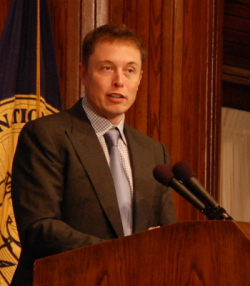Rutan, Allen, Musk, Griffin team up to develop an air-launch rocket system to fire hardware and humans into orbit.
Superstars of space: Rutan, Allen, Musk, and Griffin have teamed up to develop an air-launch rocket system to fire hardware and humans into orbit.
Their concept calls for Rutan, a noted aircraft designer, to create a carrier jet with a 385-foot wingspan and six engines to ferry a liquid-fueled, 120-foot-long rocket built by SpaceX and outfitted with five main engines to altitude where the winged booster will be released for launch into orbit.
Superstars of space: Rutan, Allen, Musk, and Griffin have teamed up to develop an air-launch rocket system to fire hardware and humans into orbit.
Their concept calls for Rutan, a noted aircraft designer, to create a carrier jet with a 385-foot wingspan and six engines to ferry a liquid-fueled, 120-foot-long rocket built by SpaceX and outfitted with five main engines to altitude where the winged booster will be released for launch into orbit.

